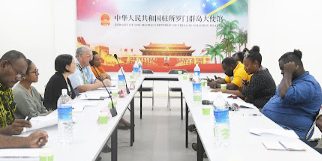A MEETING aimed at promoting the export of Solomon Islands products to the Chinese market was successfully held on August 9 at the Chinese Embassy.
Officials from the Ministry of Foreign Affairs and External Trade (MFAET), Ministry of Agriculture and Livestock (MAL), Ministry of Health and Medical Services (MHMS), the Customs and Excise Department of the Ministry of Finance and Treasury (MoFT) and the Chinese Embassy discussed measures to facilitate the export of local agricultural and fishery products to China.
In July 2023, Solomon Islands and China signed an Inspection and Quarantine Protocol for copra oil cake and during Prime Minister Manele’s visit to China, the two sides signed the Protocol of Phytosanitary Requirements for coffee beans and cocoa beans, Protocols on Inspection, Quarantine and Sanitary Requirements for cultured and wild aquatic products.
These agreements are part of broader efforts to enhance trade relations between China and Solomon Islands, specifically focusing on the export of agriculture and fishery goods from the Solomon Islands to China.
According to the agreements, the products should meet the biosecurity requirements of GACC (General Administration of Customs of the People’s Republic of China), such as export enterprise registration, the certificate of origin issued by SICED, and the inspection and quarantine certificate issued by MAL or MHMS before they can be exported to China.
In her opening remarks, Counsellor Gong Rui of the Chinese Embassy said that China is the biggest trade partner of Solomon Islands and a huge export market for Solomon Islands products.
In 2022, China granted Solomon Islands the non-reciprocal preferential tariff treatment, 98 percent of products from Solomon Islands can be exported to China duty-free.
She hopes more local agricultural and fishery products will be exported to China in the future, which will not only increase the income for Solomon Islanders but will also inject more vitality into Solomon Islands economic development.
Cr Rui said the Chinese Embassy will do its best to support the development of trade between the two countries.
MFAET’s Director of External Trade, Natalia Patternot stated that she will actively coordinate with relevant ministries, strengthen cooperation with all parties including the Chinese Embassy and promote the early export of agricultural and fishery products to China.
Comptroller of Customs Peter Hughes thanked the Chinese Embassy for introducing and explaining the processes and said the customs will issue certificates of origin for exports to China following relevant procedures.
MAL Deputy Director of Biosecurity Crispus Fanai and MHMS Chief Health Inspector Patricia Soqoilo said they will closely work with GACC and private companies for the registration and issuance of relevant inspection and quarantine certificates.
In the meeting, five biosecurity officials who had attended the training programs in China also shared their observations and experiences.
They said the training provided them with valuable learning opportunities and opened their eyes. During the training, some of the officers visited the Chinese Custom’s testing centers and places like aquatic farms and greenhouses.
They learned not only first-hand knowledge of China’s bio-safety inspection and quarantine process but also aquaculture development experience which they will share with their colleagues and apply in the development of their own countries.
They also felt the vitality of the Chinese economy and the hospitality of Chinese people. Technical trainings and human resources cooperation projects are very important part of China’s foreign aid programs.
Since the beginning of this year, Chinese Embassy is working closely with MFAET, nearly 200 participants from Ministries, universities, chambers of commerce and provinces have visited China to attend seminars such as Vocational Education, Renewable Energy Industry Promotion, Circular Agriculture and Poverty Alleviation, Malaria Control, Big Data Technology, Modern Livestock Farming Management, Young Entrepreneurs Ability Building and so forth.
In the future, the Chinese Embassy in Solomon Islands will work together with Solomon Islands Embassy in China to arrange online meetings next month attended by Chinese Customs and relevant Solomon Islands Ministries on topics like how to issue certificates, register exporters, and other specific procedures.
Opening remarks by Counsellor Gong Ru
Free discussion by Biosecurity Officer from MAL and Health Inspector from MHMS
Remarks by Comptroller of Solomon Islands Customs Department Peter Hughes









